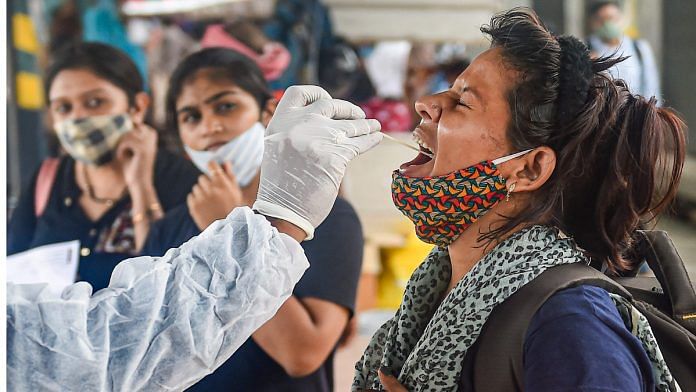New Delhi: Two years of the Covid pandemic have seen an unprecedented rise in the number of paper submissions received by the Indian Journal of Medical Research (IJMR), the in-house journal of the Indian Council of Medical Research (ICMR).
At 2.37, the impact factor of the journal — an index that estimates how many times articles presented in a given journal have been cited in other scientific publications — is at an all-time high too.
According to a senior scientist at the ICMR, the number of paper submissions has gone up 2.5 times in the last two years.
The ICMR has brought out five special issues on Covid, one special issue on ‘One Health’, and another on women and cervical cancer through this period.
“I am not at liberty to disclose the exact numbers [of] paper submissions pre- and post-Covid, but I can say that submissions have increased by 2.5 times, which is normal in a medical emergency situation,” a senior scientist working with the IJMR told ThePrint on condition of anonymity.
“Covid does seem to be on the wane now but we are expecting this pace to be sustained in the coming days too,” the scientist said.
Last month, in a public notice inviting expressions of interest (EoI) from publishers to be associated with the IJMR, the ICMR said: “With the onset of the Covid-19 pandemic, there is a renewed vigour in publication of research findings. Also, with the increase in the impact factor of IJMR recently (>2) and the media attention some articles published in the IJMR have received, there is a staggering increase in the number of article submissions.”
The current publisher of the journal is Medknow, part of Wolters Kluwer Health, which is one of the largest open-access publishers worldwide with more than 450+ medical journals in its portfolio.
According to the EoI requirements, the publisher needs to provide an e-editorial manager, an online manuscript processing platform with integrated iThenticate Plagiarism Detection software, and a standalone quality website with good mobile responsiveness.
The publisher should also be a member of the Committee on Publication Ethics (COPE) to ensure compliance with international ethical standards.
Also read: Drones could help with quicker detection of drug-resistant TB, ICMR study says
IJMR started in 1913
The Indian Journal of Medical Research has been the flagship journal of the ICMR since 1913.
According to the ICMR’s own assessment, it is one of the oldest medical journals not just in India but in Asia. The IJMR is published monthly, in two volumes, and 12 issues per year. All articles are peer-reviewed.
Through the pandemic, many important papers on the state of the pandemic in India were published in the journal, including a paper last year that looked at the plausibility of a Covid third wave in India. This paper had ICMR Director General Dr Balram Bhargava among its authors.
Another one, authored by Dr Samiran Panda, head of epidemiology and infectious diseases at ICMR, dwelt on the dilemma of opening schools.
Among other subjects, studies in the journal also tackled the subject of chloroquine, which India for long persisted in using as a preventive therapy against Covid, even as the world at large rebuffed the idea.
While the IJMR impact factor is not very high in comparison to many foreign medical journals, it is the one cited most often among Indian counterparts.
It also has a uniquely Indian identity different from other medical journals.
In January 2019, the IJMR brought out a collector’s edition to commemorate 150 years of the birth of Mahatma Gandhi with an issue whose cover story talked about “Gandhi and Health”.
Also read: How AI is changing India’s healthcare — it’s reading scans, predicting risks & a lot more



